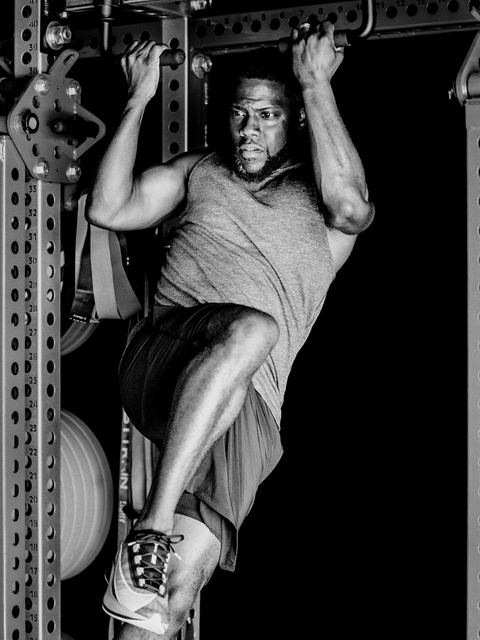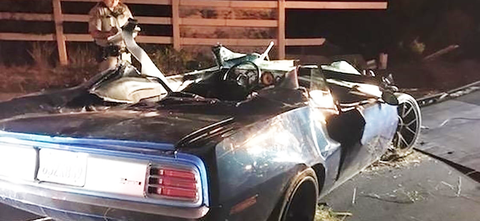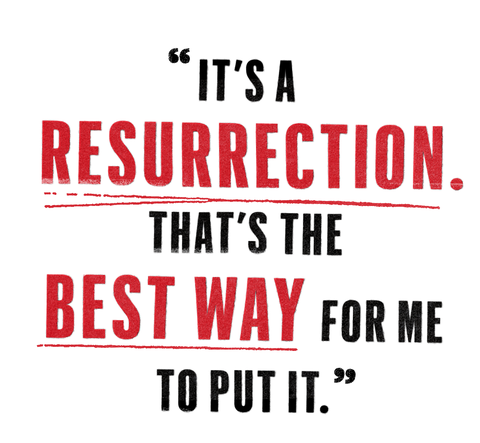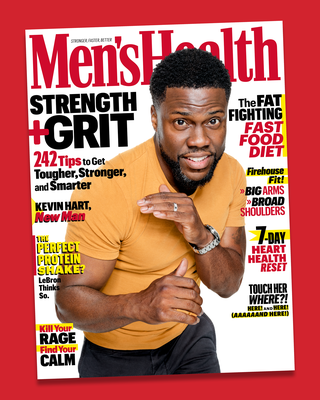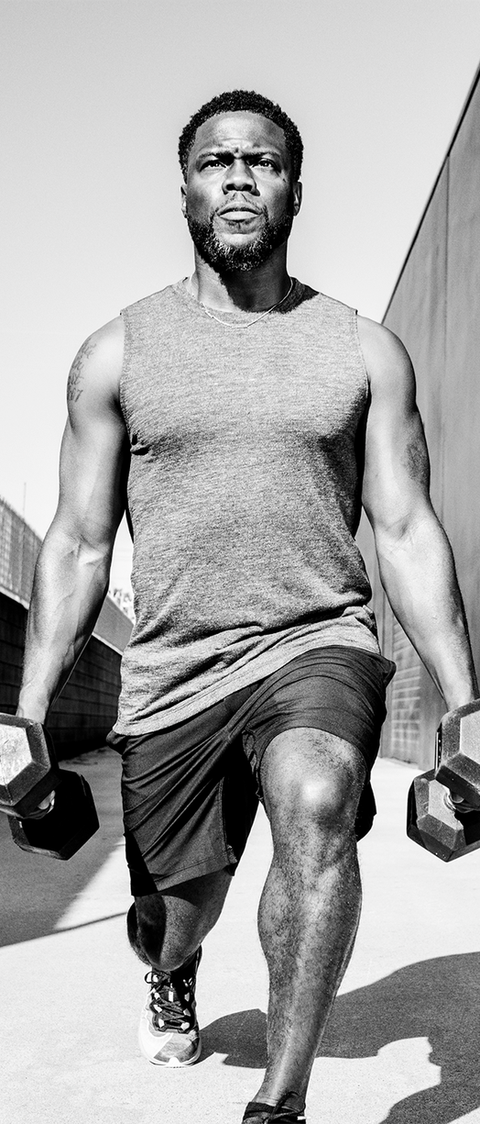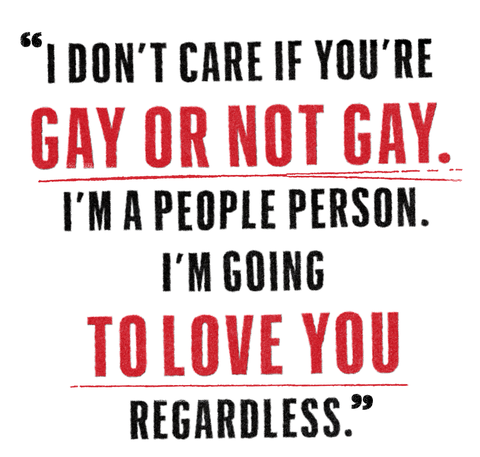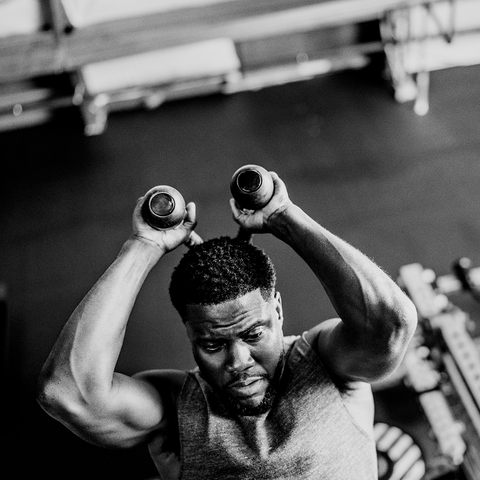
KEVIN HART WALKS OUT of the darkness. Sunlight won’t spill over the Santa Monica Mountains for an hour, but the actor offers a quick handshake and throws a leg over his Airdyne, dutifully churning his arms and legs as his friend and longtime personal trainer, Ron “Boss” Everline, warms up to his left on a treadmill.
Hart, 40, is wearing a gray hoodie, black shorts with leg sleeves, and a big-ass smile. He’s slurping down an energy drink and bemoaning the trivial headaches of parenting while rhyming with Meek Mill. “I’m a big dog,” he chants over the thumping beat. His wife and three children are sleeping in the house across the yard, so I’m assuming his gym is soundproof.
After Hart and Everline switch machines, Hart comfortably runs at a ten-minute-per-mile pace. The shit-talking banter is considerably better than average. Hart mentions that he’s thinking of mandating an ugly-sweater theme for his production company’s Christmas party. “Oh, yeah?” says Everline. “Then I’m going to wear one with your face on it.” Hart explodes and his shoulders convulse. Despite all the one-liners, the businesslike vibe is no joke. With little rest, the two men slide through a dumbbell-superset HIIT workout. In between sets, Hart spars on a heavy bag or works his core with a stability ball and occasionally pounds on his phone; he’s awaiting box-office estimates for Jumanji: The Next Level, which opened last night.
There’s nothing extraordinary about watching Hart, whose net worth is estimated at $200 million, grunt through this workout, other than basically everything. As Hart rolls sideways off the bench rather than sitting up after a set of dumbbell presses, the backstory emerges in stark detail: This is a man who was motionless in a hospital bed after a massive car wreck only three months ago.
It was the kind of crash that could have changed Hart’s life forever—which, in a roundabout way, it did. Hart pushes hard for more than an hour, doing dumbbell squats and standing curls and all-out bursts on the Airdyne. Everline hands him dumbbells to bench-press and Hart declares that he’s ready to go up in weight.
Once he hisses through his last set of squats, Hart rubs a spot on his back. He insists that it doesn’t hurt; it’s just a moment of weakness on the path to getting stronger. Hart also maintains that these workouts aren’t part of a comeback. “I’m not trying to get back to where I was before—I want to be better than before,” he says, and then recounts the instant he was strapped into an ambulance.
“It’s a resurrection. That’s the best way for me to put it. I feel like the other version of myself died in that moment and this new version was born to understand and to do better. Sometimes you’re not going to get it when you’re supposed to get it. But when it comes and that light bulb goes off, holy fuck.”
Hart says his gym rehab is only a piece of a broader overhaul—a starting point and a symbol for his quest to improve himself. Still, the grind matters. As they grit through a third set of planks, Everline reminds Hart to keep his butt down. “Why you nasty like that?” barks the actor, his mock anger filling the room. “I already gave you a three-month head start. Well, guess what? I’m back, bitch.”
LYING SHIRTLESS ON A massage table, Hart is talking about the thing he’d rather not think about. The workout ended an hour ago—Everline has left and Hart’s kids have gone off to school—and now the actor is back in the gym for a PT session. The floor-to-ceiling windows look out onto Hart’s backyard paradise, complete with a resort-quality pool and a beach-volleyball court, but we’re less than a mile from where his life almost ended after midnight over Labor Day weekend. “I can’t tell you nothing about it. Isn’t that scary?” says Hart. Pat Khaziran, D.O., a chiropractor who has massaged and manipulated Odell Beckham Jr., Julio Jones, and Sean Combs, is cupping and prodding Hart’s back. “The first thing I remember is being in the ambulance with my wife.”
Of course, anyone with Internet access can call up a picture of what happened—a scene in which Hart’s muscular 1970 Plymouth Barracuda was transformed into a crumpled heap after flipping off an embankment. “I remember seeing the photos of that smashed-up car,” says Jack Black, who starred alongside Hart in both Jumanji movies. “My mind couldn’t help but go to the worst possible scenario. I was just praying that he’d walk again.”
Hart suffered three spinal fractures. He says that a surgeon who operated on his back told him that if those fractures had been a quarter centimeter in one direction, he would’ve been paralyzed. “At the time, I thought, He’s got to take a year off and just get healthy,” admits Black. “But he’s not that kind of person.”
Everline recalls visiting Hart in the hospital “right away” after the crash. “It was tough to see my friend in such a tough place,” he says. “He couldn’t move. Honestly, I was just glad that he was alive. But even then he seemed hopeful. He already had this mind-set that he’d bounce back.” Within days, says Everline, he and Hart were formulating an action plan to rebuild the actor.
With support from his trainers, family, and friends, Hart started to claw his way back. “He didn’t allow the injury to defeat him,” says Eniko, Hart’s wife of four years. “Because of his go-getter mentality, it never was a question whether recovery was going to be challenging.” At first it was basic movements—even shifting in bed took therapy and effort. Physical improvement came, not quickly but steadily. Those closest to Hart were hardly shocked. “His physical progress wasn’t surprising, because Kevin was in tremendous shape before the accident,” says his good friend (and Jumanji costar) Dwayne Johnson. “His body composition and muscle memory are working in his favor.”
Still, although the recovery sounds like a miraculous certainty now, there were moments when Hart felt mired in helplessness. In an early-December appearance on Ellen, for instance, Hart shared one lowlight: “I couldn’t wipe my ass,” which made the studio audience laugh uncomfortably. But now he also admits he was preoccupied with another basic struggle: to put on his socks. “You’d think that wiping my own ass should be the biggest victory, but putting on my socks was a bigger deal. I felt so hopeless not being able to do something that once was so easy.”
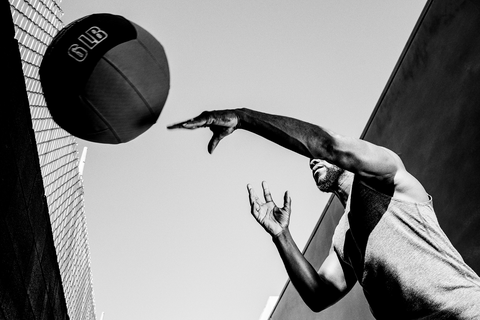
Even though it was forbidden, Hart says that every morning he snuck into his closet, where his wife couldn’t see him, to track his progress. “So there I was, hiding in my closet, trying to put my socks on,” he laughs. “One morning I got to walk out and declare, ‘I put my socks on!’ Goddamn, that was a big day!” The celebration stops for a moment as Hart winces; Khaziran is stretching the actor’s hips and hamstrings. This is not a spa treatment. I ask the chiropractor, who began working with Hart during his marathon training two years ago, to name the biggest challenge in his client’s rehab.“In a word: rest,” says the man Hart calls Dr. Pat. “When we first started, I told Kev we should go three or four days a week, but he said he wanted to go seven and then go twice a day. I had to convince him that rest is part of the rehab.”
The conversation pauses as Hart’s phone buzzes. The opening-night numbers from Jumanji: The Next Level have arrived: above expectations at $4.7 million. “Oh, that’s nice,” Hart purrs. “That’s pretty goddamn huge.” He divulges that he felt pressure for the movie to hit the studio estimate of $35 million to $45 million in its opening weekend. (In fact, it raked in $60 million.)
With that minor victory acknowledged, Hart swings back to his struggles to listen to his body and his trusted advisors. “The hardest part is slowing down and being patient,” he says as Khaziran finishes the session. “I’m telling Dr. Pat and Boss that I want to do two-a-days at the gym. And they’re like, ‘Sit your stupid ass down and be patient. You gotta heal.’ I get that now.”
THE NEXT TIME I SEE HART, a few days later at an audiobook recording session, I’m given an opportunity to peer into his mind. Hart is uncharacteristically late to the Woodshed studio in Malibu. He bursts in, full of manic energy. “Sorry, I ran 1.6 miles for the first time this morning,” he declares. “Keep in mind that this is the furthest I’ve run so far without stopping, which is great. But I had to sit down for some time after that.” The actor is here to record the audio for an upcoming Audible Original project: The Decision, which will be released this spring. (I’ve been cautioned to avoid calling it a book, since the contents will not be available in print.) In the room are sound engineers with the Woodshed, some Audible execs, and a lean man in a lumberjack shirt and muddy Vans slip-ons. That’s Neil Strauss, Hart’s collaborator on this project. Like Hart, Strauss has been on a life journey full of controversy and success—transitioning from a respected music journalist to a celebrity pickup artist to a sort of guru of self-realization.
Hart heads into an isolation booth to record. What happens next is not like a normal audiobook recording session. Strauss is frantically typing on his laptop and texting passages and ideas to Hart, who lets shit fly like he’s onstage. There are tangents and F-bombs and an off-script impression of Steven Seagal, but there’s also a surprising clarity to the self-help narrative. The project focuses on Hart’s wisdom about making and owning the choices that determine your future. “In everything you do, you have an opportunity to make a right or a left or go straight or backward,” says the actor during a break. “I’m trying to make people understand that we’re in control of ourselves. It’s easy to assume other people have control or to give other people that control, but it boils down to you figuring out the way to be the best version of yourself.”
Later, Hart outlines a technique he calls Taking the Bullets Out of the Gun. He’s talking about disarming critics by stealing their weapons before they can harm you. Hart knows how to tell rambling, hilarious, gut-punch stories to packed arenas, and he deploys those talents here. He explains how he’s always been upfront about being short and having a father who was on drugs—how by owning these admissions, no one can leverage them against him.
Hart is an effective but curious vessel for this advice. Hollywood supports a cottage industry of crisis managers, who help movie stars navigate scandal. Typically, the talent just holes up as PR consultants try to work back-channel magic. At first glance, Hart might seem like a crisis manager’s dream client. In 2019, for instance, the actor stepped down as host of the Oscars after decade-old anti-gay tweets surfaced, and he faced multiple lawsuits, including an emotional-distress complaint filed by a woman who appeared in a widely publicized sex tape—a glaring reminder that Hart cheated on Eniko when she was pregnant, as he’s admitted.
But while most other movie stars would hide and spin, Hart faces these scandals head-on—trying to take the bullets out of the gun. He posts explanations and apologies on social media, integrating his drama into his art. In late December, Netflix released Don’t F**k This Up, a six-part docuseries that shadows Hart during his 2019 roller coaster. “I’m a firm believer in laying in the bed that you made,” says Hart. “If there’s something that you did, then you did it. You know, there’s no wiggle room around it. You can address it, and then you can move on.” Even his wife, who at times has been dragged into the gutter by Hart, appreciates how he refuses to run away from his notoriety. “I admire his transparency,” says Eniko. “Because you get something real—there’s no smoke and mirrors.”
With regard to the Oscar debacle, Hart admits that he mishandled his initial response to the tweets. “With the whole Oscars thing, there was a big gap between what I thought the problem was versus what the problem really was,” he says. He got angry, reacting as though the only problem was that people were calling him homophobic, which he feels certain he’s not. “I got ten years where I made sure not to joke or play in the way that I did back then because it was a problem,” he says. “I don’t care if you’re gay or not gay. I’m a people person. I’m going to love you regardless.” But now he sees a layer that he overlooked at the time—that he missed a chance to condemn violence in every shape and form to anyone for being who they are. “It wasn’t until close friends like Wanda Sykes, Lee Daniels, and Ellen [DeGeneres] talked to me and explained what they didn’t hear me say that I understood. Then I was like, ‘Oh, shit—I did fuck up.’ ”
This, in part, is the spirit of his Netflix doc and upcoming don’t-call-it-a-book—this idea of coming clean and being unafraid to own your shit. “People attach failure or an ending to a problem,” says Hart. “Well, problems are made to be solved. Maybe if people see how I’ve gone through some of my hardships, they’ll find some motivation or inspiration.”
When asked if he’s ever had any reservations about oversharing his personal issues with the public, Hart just laughs. It’s not the full-body laugh of reacting to an ugly-sweater joke; it’s a chuckle from a deeper place. “I don’t give a shit. I mean, what are you going to do? You have no effect on me or my household.”
Later, I talk to Jack Black about this response. “That’s the thing we love about Kevin: He’s not afraid to go to dangerous places on the stage and the material that he explores. He goes to some honest places that most people wouldn’t feel comfortable revealing about themselves, and yeah, he lives his life like that, too.”
When I press Black to think of one word to describe Hart, he answers without hesitation. “Fearless. Kevin likes to get out there without a net on the high wire, making shit up as he goes along to find that improvisational electricity. It’s a kind of adrenaline; Kevin runs on a certain kind of rocket fuel.”
Back at the Woodshed, Hart is on the high wire, dispensing self-help advice with a careening vigor that Dr. Phil would never attempt. “So many times, people are afraid to be vulnerable, because they’re afraid what people might think,” he says, his voice rising as he surveys his wisdom. “I am shitting out information nuggets here! I suggest you pick them up.”
KEVIN HART IS ALONE in his gym. His trainers and his rehab specialist are gone. No celebrity ghostwriters or security staff or family friends are in the room. The actor is sitting on an exercise bench, talking about something bigger than rebuilding his lower back—he’s talking about rebuilding his life.
In his mind, Hart barely escaped a life of paralysis, and he’s recounting how he felt lying in the hospital. “It all boiled down to four walls. And in the space of those four walls was my wife and my brother, my kids and my friends, all on rotation. And I got a chance to think about what matters, and it’s not fame. It’s not money. It’s not jewelry, cars, or watches. What matters are relationships. You know, the people that were helping me get up and out of the bed.” Hart pauses. “The biggest realization came from something somebody told me,” he says. “ ‘You can’t be married to your career and date your family.’ That blew me the fuck away.”
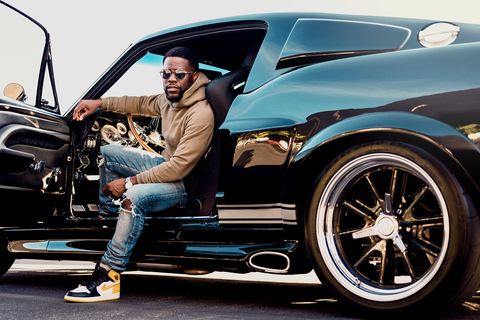
Hollywood is full of workaholics, but few have been as compulsively committed to the hustle as Hart. Even now, as he tries to recalibrate his priorities, he is promoting a blockbuster, producing films, releasing a documentary, itching to get back to doing live comedy in arenas, and managing enterprises such as a wellness business appropriately called VitaHustle. Sometime soon he will be named the first male ambassador of Kate Hudson’s athleisure brand, Fabletics. Hart also recently signed a multiyear deal with Peakcock, NBCUniversal’s forthcoming streaming service that includes a stand-up comedy special, an original interview series, Hart to Heart hosted by the comedian, along with a series of short-form content, and more. He has lived life like a mogul who often does comedy.
Hart says he understands now that the hustle is his superpower and his kryptonite. “I’m addicted to the fucking work,” he says. “I’d much rather that be my addiction than be strung out on crack, but now I have to struggle to find balance. That hustle is not going anywhere, but I want it suppressed and balanced so I can put the same kind of energy into my family.”
Hart describes a reckoning he had in the aftermath of the crash. The actor invokes a metaphor from The Decision: We make life choices like we’re the brains guiding a commute on Waze. “I’m on the road to becoming the best version of myself,” he says. “And I thought I was on the right road, but something happened. Fuck, I see now that I need to make a U-turn and go two blocks, then make a left. That’s the road I’m supposed to be on. So I still have many of the same goals, but now I’m just going down a different road to get there.”
Today, says Hart, he’s ready to be more committed to his family. He’s slowing down the pace of his film projects and leaving work early enough to be there when his kids get home from school. “Honestly, there’s a lot that I wasn’t doing,” he says. “Now I’m doing a lot of little things that are important. I’m sitting with the kids before and after dinner. We are doing taco Tuesdays, Mexican-food Thursdays, Chinese-food Sundays. We got movie night twice a week. Now I’m walking my fucking dog. I’m picking up dog shit.”
Eniko says she can see the change in her husband. “There were times where he was here but not really here,” she says. “Not to say he wasn’t a family man before, but he’s expressed that the accident made him make up for some of the time missed because of work.” Hart’s friends see it, too. “I visited him a few weeks after the accident, and he seemed to be coming from a different place emotionally and spiritually,” says Black. “He kept on saying that he was going to take this opportunity to breathe and slow down and appreciate his family.”
“Kev and I have had some pretty moving conversations about his life journey and purpose after his accident,” says Johnson. “The experience he went through was both sobering and enlightening. When someone stares death in the eyes—and lives—you instantly become newly informed on just how fragile life is. Give an optimistic person a new lease on life and then get outta the way, because they’re gonna be rollin’. Kev is rollin’.”
Sitting in the gym, where he is building back his strength and changing his outlook, Hart tries to express how it all ties together. “This road to my fitness matches my mindful progression,” he says. “It matches my career and my approach to everything.” After a few unexpected left turns, Hart finds himself on a new journey. He was a quarter centimeter from a life-altering injury, and now he’s on a different path with refined priorities. “I’m glad that it’s coming now,” says Hart. “I’m getting older. I’m 40. You know, this is when I’m supposed to be realizing this shit.”
What is that, exactly? What has Hart realized? “I’m saying make sure you’re implementing the same amount of time and energy into being present for what matters,” he answers. “Because when shit hits the fan, you’re going to realize that the things that matter are all you truly care about. Nothing else fucking matters.”

You can check out the latest casting calls and Entertainment News by clicking: Click Here
Click the logo below to go to the Home Page of the Website
Click the logo below to follow ETInside on Twitter
Click the logo below to follow ETInside on Facebook
Click the logo below to follow ETInside on Instagram
Click the logo below to follow ETInside on Pinterest
Click the logo below to follow ETInside on Medium

